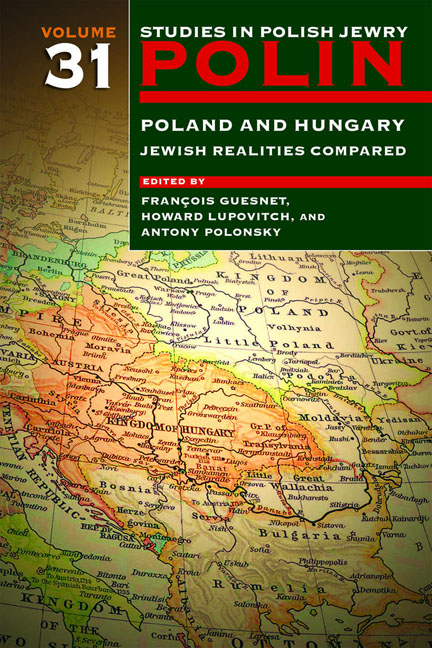Book contents
- Frontmatter
- Dedication
- Editors and Advisers
- Preface
- Polin
- Polin: Studies in Polish Jewry
- Contents
- Note on Place Names
- Note on Transliteration
- Part I POLAND AND HUNGARY: JEWISH REALITIES COMPARED
- JEWISH ACCULTURATION AND INTEGRATION
- JEWISH RELIGIOUS LIFE
- JEWS IN POPULAR CULTURE
- THE INTERWAR YEARS
- THE HOLOCAUST AND ITS AFTERMATH
- PERSONAL REFLECTIONS
- Part II NEW VIEWS
- Part III OBITUARIES
- Notes on the Contributors
- Index
On the Margin of A Historic Friendship: Polish Jewish Refugees in Hungary During the Second World War
- Frontmatter
- Dedication
- Editors and Advisers
- Preface
- Polin
- Polin: Studies in Polish Jewry
- Contents
- Note on Place Names
- Note on Transliteration
- Part I POLAND AND HUNGARY: JEWISH REALITIES COMPARED
- JEWISH ACCULTURATION AND INTEGRATION
- JEWISH RELIGIOUS LIFE
- JEWS IN POPULAR CULTURE
- THE INTERWAR YEARS
- THE HOLOCAUST AND ITS AFTERMATH
- PERSONAL REFLECTIONS
- Part II NEW VIEWS
- Part III OBITUARIES
- Notes on the Contributors
- Index
Summary
IN THE AUTUMN of 1939 in the wake of the Polish defeat at the hands of Nazi Germany and the USSR, the Hungarian political leadership decided to admit Polish military and civilian refugees, including a number of Jews, into the Kingdom of Hungary. Over the past seventy years a large number of studies and memoirs have been published on this subject in both Hungary and Poland. While they do not deny that many problems emerged as a result of this flight, a somewhat idealized picture has developed of Hungary during the Second World War as a ‘paradise for refugees’. According to this, not only Polish but also German, Austrian, French, British, and Italian Jews lived together peacefully side by side with the Hungarian people. In turn, the Hungarian public administration ‘took good care’ of them. This image needs to be significantly modified in the light of archival documents.
Before turning to this specific topic, it is useful to outline the historical relationship between Hungary and Poland. According to a well-known saying: ‘Polak, Węgier — dwa bratanki, i do szabli, i do szklanki’ (‘Poles and Hungarians are brothers, good at fighting; good at drinking’). On a number of occasions the two countries have had the same ruler. Louis I (king of Hungary and Croatia, 1342–82; king of Poland, 1370–82) and Władysław III (king of Poland, 1434–44; king of Hungary and Croatia, 1440–4). In addition, István Báthory, prince of Transylvania, was also king of Poland between 1576 and 1586. In the Hungarian revolution and war of independence of 1848–9, many Poles, including Józef Bem and Henryk Dembiński, fought in the Hungarian Honvéd Army. Between 1867 and 1918 the Hungarians and a part of the Polish population were subjects of the Austro-Hungarian empire. Although at that time there was no independent Polish state, the Hungarians sympathized with anything that was Polish, especially if it also had an anti-Russian edge.
However, the First World War and the peace treaties that followed fundamentally changed the history of the two peoples and their relationship to the world.
- Type
- Chapter
- Information
- Polin: Studies in Polish Jewry Volume 31Poland and Hungary: Jewish Realities Compared, pp. 349 - 364Publisher: Liverpool University PressPrint publication year: 2018



